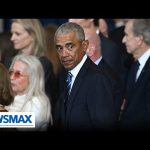## The Russia Collusion Debate Persists: Context and Controversy
The discussion surrounding John Durham’s investigation into the Russia collusion narrative continues to fuel political tension, with recent developments in the sparking debates about media framing and political motivations. Below is a balanced overview of the key points and perspectives:
—
###
1. :
John Durham’s probe, initiated in 2019, examined the origins of the FBI’s Trump-Russia collusion investigation. His final report criticized FBI missteps but found no conclusive evidence of systemic collusion. The , a forthcoming document, allegedly highlights new details about intelligence community actions, including claims that federal agencies disseminated or relied on unvetted information during the Russia probe.
2. :
– : Recent NY Times reporting suggests the Durham annex may contain material the outlet characterizes as , potentially aimed at undermining U.S. election integrity claims.
– : Figures like Miranda Devine (columnist) and Devin Nunes (former House Intelligence Chair) argue this framing deflects scrutiny of institutional misconduct and aligns with Democratic efforts to dismiss the Russia probe’s critiques as politically motivated.
3. :
The annex’s release intersects with broader disputes over theories and the legacy of the Mueller probe. Supporters of the Durham investigation view it as exposure of bureaucratic overreach, while opponents see it as a partisan vendetta.
—
###
On Sean Hannity’s Fox News program, panelists:
– : Argued the NY Times is “spinning” the annex to protect Democratic narratives, framing Durham’s findings as part of a Russian influence campaign.
– and : Emphasized concerns about government surveillance and politicized intelligence, positioning the annex as evidence of systemic bias.
—
###
– : Advocates see the annex as validating critiques of the Russia investigation’s handling, seeking transparency and accountability.
– : Argue the annex lacks transparency, with media outlets cautioning against accepting unvetted claims without full context.
—
###
This debate reflects ongoing tensions over:
– : How outlets frame investigations impacts public perception (e.g., “disinformation” vs. “whistleblowing”).
– : The collusion narrative remains a litmus test for views on institutional integrity and partisanship.
—
###
To navigate this complex issue:
– : Compare reports from outlets with varying biases (e.g., NY Times vs. Fox News).
– : The Durham annex’s content remains contested—assign judgment until verified details emerge.
– : Remember the Russia collusion narrative has sparked years of litigation, audits, and partisan infighting, requiring patience and skepticism toward sweeping claims.
This ongoing saga underscores the challenges of holding power accountable while avoiding false equivalency or dismissiveness toward credible concerns.




